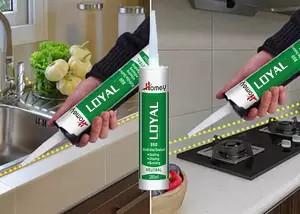How to test the performance of silicone structural adhesive for glass curtain wall?
China's curtain wall glass has been developed for more than 20 years, and it has achieved outstanding achievements, which have attracted the attention of the world.
Many curtain wall glass buildings have a certain history and have been used for more than 10 years. If they fail to pass certain tests, there may be potential safety hazards that are easy to ignore.

Therefore, some ancient glass curtain wall buildings need to be evaluated for reliability.
The commonly used silicone structural adhesive is used as a necessary bonding material for curtain wall glass, and its performance is also one of the factors for monitoring the safety of glass curtain wall, so its performance test is an indispensable link.
At present, the commonly used methods for the performance testing of curtain wall structural adhesives are: direct sampling method, applying external force to measure strain method, and applying excitation method to measure physical parameter change.
The direct sampling method needs to destroy the aluminum material and structural adhesive for sampling, which has disadvantages such as difficulty in operation; the method of applying external force to measure the strain and the method of applying excitation to measure the change of physical parameters cannot detect the tensile strength of the structural adhesive, and cannot evaluate the performance of the structural adhesive.
These commonly used test methods have certain limitations.
Now, our country has developed a new method-rebonding method, which is relatively simple, easy and reliable.
The rebonding method is a method of directly sampling the existing curtain wall structural adhesive, making H-type test pieces with a specific size, and testing data such as tensile strength and elongation through a universal tensile machine.
Compared with the traditional measurement method, the rebonding method still has some remarkable points:
1. It can directly detect the tensile strength of the existing curtain wall structural adhesive
The tensile strength and maximum strength elongation of the silicone structural adhesive can be tested by preparing the rebonded H-type test piece with a universal tensile machine, and the tensile strength value of the existing curtain wall structural adhesive can be obtained.
2. The test results can be used as the basis for evaluating the safety of structural adhesives
The tensile strength obtained by re-bonding the H-type test piece can be compared with the existing national standards for silicone structural adhesives to determine whether the structural adhesive meets the requirements for use.
3. The performance of hollow structural adhesive can also be detected
It overcomes the limitation that the traditional method cannot detect the hollow structural adhesive, and can directly sample and test the hollow structural adhesive to obtain relatively accurate data such as the tensile strength of the hollow structural adhesive.
4. Can effectively detect brittle structural adhesives

For the structural adhesive that has become brittle and aged in the curtain wall, samples can also be taken to prepare the H-type test piece by the rebonding method. The tensile strength of the brittle structural adhesive can be obtained, and the aging performance can be evaluated. The obtained maximum strength elongation can be as a reference index for evaluation.
The rebonding method can be used to test the performance of existing curtain wall structural adhesives. The test method is relatively simple, and the test results can be used as an important basis for evaluating the performance of existing curtain wall structural adhesives, which has certain significance for the development of reliability evaluation and identification of existing curtain walls. .